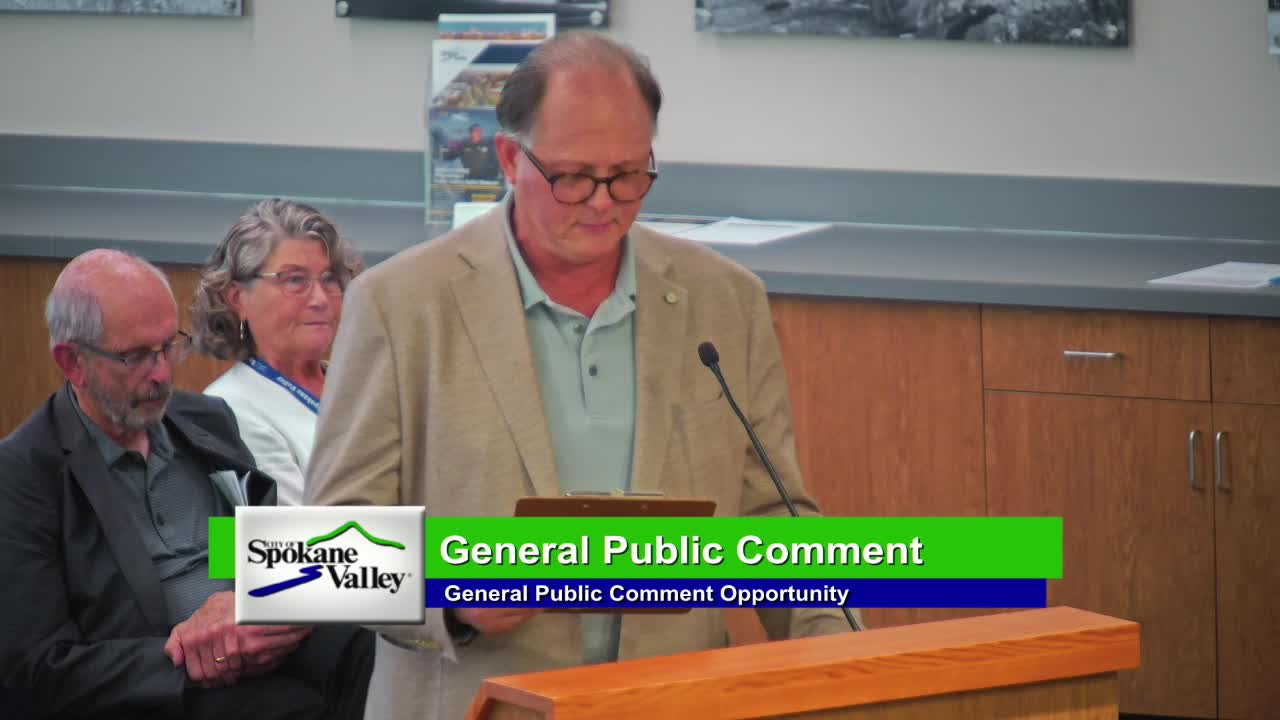Spokane Valley Council Approves New Telecommunications Franchise and Emergency Tower Height Ordinance
July 29, 2025 | Spokane Valley, Spokane County, Washington
This article was created by AI summarizing key points discussed. AI makes mistakes, so for full details and context, please refer to the video of the full meeting. Please report any errors so we can fix them. Report an error »

In the heart of Spokane Valley, city council members gathered under the bright lights of city hall to discuss pivotal issues that could shape the community's future. Among the key topics was a proposal for a regional cross-country course, which advocates argue could bolster not only local sports but also the economy. "This isn't just about sports," one council member emphasized, highlighting the potential for economic development and increased access for residents. The proposal aims to position Spokane Valley as a premier destination for cross-country competitions, akin to Spokane's reputation for basketball.
As inflation continues to challenge budgets, supporters of the course believe it represents a smart, scalable investment that requires minimal infrastructure. They urged the council to look beyond local skepticism, particularly comments circulating on social media, and to consider the long-term benefits for the community's youth and local businesses.
The meeting also addressed the urgent need for updated telecommunications infrastructure. The council reviewed Ordinance 25-012, which would grant a nonexclusive franchise to Fat Beam Telecommunications. This new agreement is set to replace a decade-old contract, ensuring that the city’s telecommunications facilities remain up-to-date and compliant with current laws. The council unanimously approved the motion to advance the ordinance, reflecting a commitment to maintaining robust communication services for residents.
Another significant discussion revolved around emergency regulations for communication towers. The council proposed an interim ordinance to raise height restrictions for towers used by regional emergency services. This change is crucial for the Spokane Regional Emergency Communications (SHREC), which is transitioning to a new facility in Spokane Valley. The current regulations limit tower heights to 60 feet, but operational needs necessitate taller structures to avoid obstructions and ensure effective communication.
The urgency of this ordinance was underscored by the impending expiration of SHREC's lease with the city of Spokane, which has complicated their planning process. Council members expressed the importance of swift action to facilitate the construction of the new tower, which is vital for maintaining emergency communication capabilities.
As the meeting concluded, the council's discussions reflected a proactive approach to addressing both immediate needs and long-term community goals. With plans for a cross-country course and updated telecommunications infrastructure, Spokane Valley is poised to enhance its appeal and functionality for residents and visitors alike. The council's commitment to these initiatives signals a hopeful vision for the future of the city.
As inflation continues to challenge budgets, supporters of the course believe it represents a smart, scalable investment that requires minimal infrastructure. They urged the council to look beyond local skepticism, particularly comments circulating on social media, and to consider the long-term benefits for the community's youth and local businesses.
The meeting also addressed the urgent need for updated telecommunications infrastructure. The council reviewed Ordinance 25-012, which would grant a nonexclusive franchise to Fat Beam Telecommunications. This new agreement is set to replace a decade-old contract, ensuring that the city’s telecommunications facilities remain up-to-date and compliant with current laws. The council unanimously approved the motion to advance the ordinance, reflecting a commitment to maintaining robust communication services for residents.
Another significant discussion revolved around emergency regulations for communication towers. The council proposed an interim ordinance to raise height restrictions for towers used by regional emergency services. This change is crucial for the Spokane Regional Emergency Communications (SHREC), which is transitioning to a new facility in Spokane Valley. The current regulations limit tower heights to 60 feet, but operational needs necessitate taller structures to avoid obstructions and ensure effective communication.
The urgency of this ordinance was underscored by the impending expiration of SHREC's lease with the city of Spokane, which has complicated their planning process. Council members expressed the importance of swift action to facilitate the construction of the new tower, which is vital for maintaining emergency communication capabilities.
As the meeting concluded, the council's discussions reflected a proactive approach to addressing both immediate needs and long-term community goals. With plans for a cross-country course and updated telecommunications infrastructure, Spokane Valley is poised to enhance its appeal and functionality for residents and visitors alike. The council's commitment to these initiatives signals a hopeful vision for the future of the city.
View full meeting
This article is based on a recent meeting—watch the full video and explore the complete transcript for deeper insights into the discussion.
View full meeting
